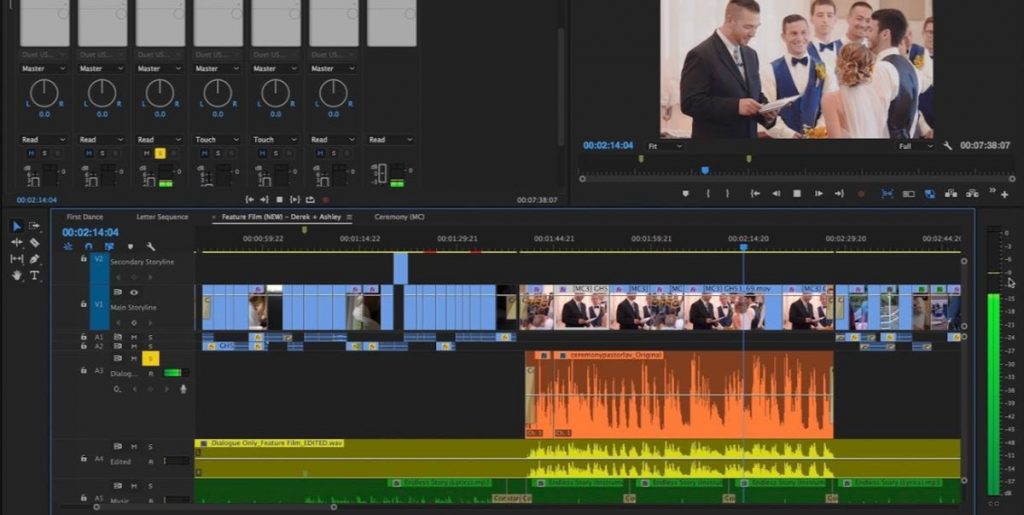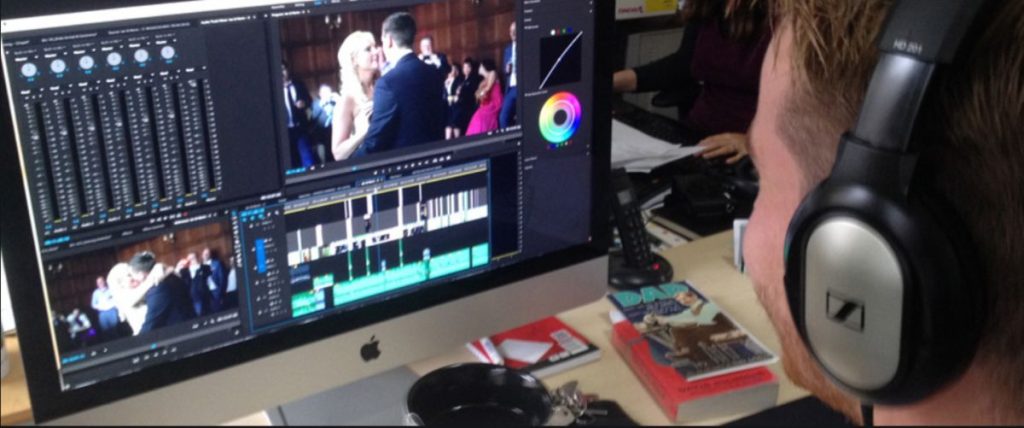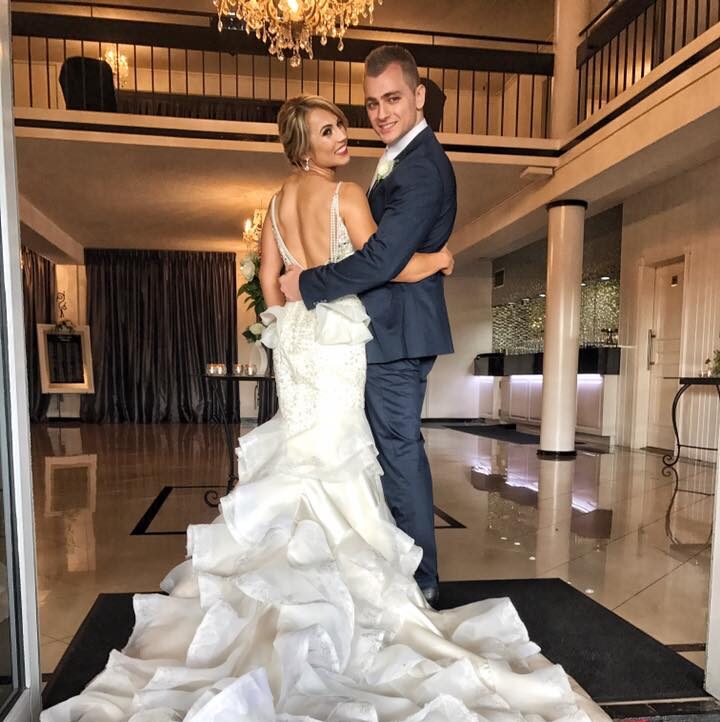Editing a wedding video is a meticulous process that requires creativity and technical skill, and the time it takes can vary significantly. On average, editing a wedding video can take 20 to 60 hours, based on the duration of the footage, the complexity of the edits, and the style of the final product.
The process typically involves sifting through hours of raw footage to identify key moments, syncing audio and video, colour correcting, and incorporating effects like transitions, music, and titles. A cinematic wedding video, which may include drone shots, detailed storytelling, and high-end production quality, can take even longer.
The timeline for editing also depends on the editor’s experience and the couple’s preferences. Some couples may prefer a simple, straightforward highlight reel, which could take less time, while others may request a feature-length film that covers the entire day in great detail.
Additional time may be needed for revisions, especially if the couple has specific requests or feedback after viewing the first cut. Overall, the time frame for editing a wedding video is influenced by the scope of the project and the level of customisation desired.
Let’s Get Straight to the Point
Editing a wedding video is time-intensive, typically taking between 20 to 60 hours, depending on the footage’s complexity, style, and length. The editing involves selecting key moments, syncing audio, colour correcting, and adding effects. Couples can opt for shorter, cinematic highlight reels or full-length documentary-style films that capture the entire day.
The standard delivery time for a wedding video is three to six months, but expedited services may be available for an additional fee. Factors like communication delays, peak wedding season, and the complexity of the video package can influence the editing timeline. Clear communication and planning during the off-season can help speed up the process.
Turnaround Time For Wedding Video Delivery
Standard Turnaround Times
- The typical delivery window for a wedding video ranges from three to six months.
- Various factors, such as peak wedding season, can extend this timeline.
- The quality of the film and attention to detail requires time to ensure a polished final product.
- The editing process can only be rushed by sacrificing the film’s quality.
Express Edit Services
- For couples with tight deadlines, many videographers offer an Express Edit service for an additional fee.
- This service delivers the final video within one month but requires the videographer to work overtime.
- Express Edits are typically limited to a few slots per year to avoid overcommitting and affecting the quality of the work.
Most wedding videos are delivered within three to six months, but expedited services are available for an additional fee.
Factors That Affect Editing Timelines
Delays In Communication
- Sometimes, delays occur due to clients needing to provide the necessary details promptly.
- Examples include failing to provide music preferences or outstanding payments.
- Resolving all these issues before or immediately after the event is advisable to avoid delays.
Time Of Year
- Peak wedding season (June, July, August) can also delay editing.
- During these months, videographers are fully booked and may take longer to complete edits.
- Off-season weddings (October, November, December) tend to have faster turnaround times.
Complexity Of The Wedding Video
- Some wedding videos include advanced editing techniques, such as colour grading, sound syncing, and special effects.
- These extra touches can extend the editing process, especially for “bells and whistles” packages that include a pre-wedding shoot, trailer, and full documentary.
Communication delays and peak seasons can extend the editing timeline. The complexity of the video package also influences delivery time.
Workflow Of A Wedding Video Editor
Uploading And Backing Up Footage
- After the wedding, the videographer uploads the footage to their computer.
- They make multiple backups to ensure the footage is secure before starting the editing process.
Organising The Footage
- The next step involves organising the footage into chronological order.
- This process helps the videographer determine the most important moments to include in the final film.
Rough Cut
- A rough cut is created, which includes all usable clips but lacks transitions, titles, and filters.
- The couple can review the rough cut to ensure it meets their expectations.
The editing process involves uploading, organising, and preparing a rough cut before finalising the wedding film.
What To Expect From The Final Cut
Music Choices
- The music included in your wedding video should reflect the songs played on the day.
- The videographer may request a list of favourite songs to include in the final cut.
Final Delivery
- The final cut of your wedding video will be polished with transitions, titles, and any additional special effects.
- Once the couple is satisfied with the final edit, the videographer will create a DVD, digital download, or upload the video to a platform like YouTube or Vimeo.
The final cut will include all agreed-upon changes, and couples can review and request adjustments before final delivery.
Why Does It Take So Long To Edit A Wedding Video?
Multiple Weddings
- During peak season, a videographer may film several weddings weekly, leaving limited editing time.
- If a videographer is booked solid for weeks, completing the edits for each wedding can take longer.
Professional Standards
- High-quality wedding videos involve detailed editing, including scene selection, colour grading, sound editing, and syncing.
- The goal is to create a film that the couple will cherish for years, which requires patience and time.
The editing process is detailed and time-consuming, especially during peak wedding season.
How To Speed Up The Process
Communicate Early And Clearly
- To avoid delays, couples should provide the videographer with all the necessary details, including music preferences, shot preferences, and final payments.
- Clear communication can ensure the editing process starts on time and proceeds smoothly.
Off-Season Weddings
- Couples who plan weddings during the off-season will likely receive their films sooner, as videographers have more time to focus on each project.
Early communication and off-season weddings help speed up the editing process.
Editing a wedding video is a time-consuming but rewarding process. While most couples are eager to relive their big day, the time it takes to produce a polished and professional wedding video can vary depending on several factors.
By understanding the difference between short films and documentary edits, communicating with your videographer, and knowing what to expect from the process, you can ensure that your wedding video will be a cherished memory for years.
Wedding videos take time to produce, but the result is a lasting memory of one of the most important days of your life.





